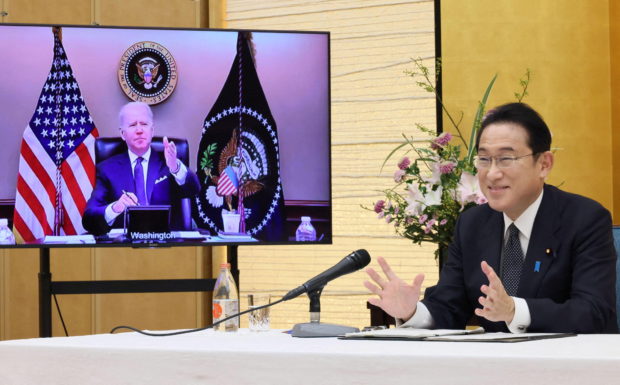Biden, Kishida agree to boost security, economic cooperation amid mounting concerns

Japan’s Prime Minister Fumio Kishida attends a virtual meeting with the U.S. President Joe Biden at his official residence in Tokyo, Japan January 21, 2022, in this photo released by Japan’s Cabinet Public Relations Office via Kyodo. (Kyodo/via REUTERS)
WASHINGTON/TOKYO – U.S. President Joe Biden and Japanese Prime Minister Fumio Kishida agreed in a virtual meeting on Friday to boost cooperation on pressing economic and security issues, including China, North Korea’s missiles and Russia’s threat to Ukraine.
The online meeting, their first substantial talks since Kishida became Japan’s prime minister in October, followed “two-plus-two” discussions this month at which defense and foreign ministers from the longtime allies voiced strong concern about China’s growing might and vowed to respond if necessary to destabilizing activity in the Indo-Pacific.
Kishida said he and Biden had agreed to cooperate to realize a free and open Indo-Pacific, to work closely on China and the North Korean missile issue and also to cooperate on Ukraine.
He also said Japan would host a meeting of the Quad grouping of the United States, Japan, Australia and India in the first half of this year with Biden visiting.
Biden accepted the invitation and indicated his intention to visit in late spring, a senior U.S. administration official said, adding that one of the aims of the Quad meeting would be to review progress of a pledge to supply a billion COVID-19 vaccine doses to Southeast Asia by the end of 2022.
Article continues after this advertisementKishida said he and Biden also agreed to set up an economic version of a “two plus two” ministerial to promote economic cooperation. The U.S. official said this would focus on supply chains, technology investments, standards setting and export controls.
Article continues after this advertisement“We agreed to work together to advance cooperation among like-minded countries to realize a free and open Indo-Pacific,” Kishida told reporters. “We agreed to closely cooperate on China-related issues, including the East and South China Seas, Hong Kong, and the Xinjiang Uyghur (Autonomous Region), as well as North Korea’s nuclear and missile issues.”
Kishida said he and Biden would work closely to prevent a Russian invasion of Ukraine and “keep close contact with other allies and partners and continue communicating on the point that any attack will be met with strong action.”In a tweet, Biden said it was “an honor to meet with Prime Minister Kishida to further strengthen the U.S.-Japan Alliance — the cornerstone of peace and security in the Indo-Pacific and around the world.”
A White House statement said Biden had welcomed Kishida’s decision to increase defense spending and “underscored the importance of sustaining these vital investments over time.”
It said the two stressed the importance of strengthening cybersecurity and resolved “to push back” against China’s attempts to change the status quo in the East and South China Seas.
The U.S. official told reporters U.S.-Japan solidarity was on “full display” in the virtual session of about 90 minutes.
The two had a “very in-depth discussion” on China, sharing concerns about its intimidation of neighbors and “predatory” steps in trade and other realms, he said, adding that Kishida was particularly concerned about China’s nuclear buildup.
The White House said the leaders condemned North Korea’s recent ballistic missile launches, and the U.S. official said Biden had made clear Washington would work closely with Japan and South Korea to discourage “possible provocations that might follow on.”
North Korea fired tactical guided missiles this week in its latest of a series of launches and warned on Thursday it might rethink a moratorium on nuclear and intercontinental ballistic missile (ICBM) tests.
The U.S. official said Biden and Kishida had had a “robust” discussion on the need for the United States to play an active role in trade and commercial architecture in Asia.
The Biden administration has been criticized for lacking a solid economic pillar to its strategy for Asia after then-President Donald Trump quit a regional trade framework now known as CPTPP in 2017, but it has been wary of returning to a pact critics say threatens U.S. jobs.
A senior U.S. policy official for China said on Wednesday Washington aims to establish “common goals” on economic cooperation with Indo-Pacific countries in early 2022.
Friday’s summit followed other security-related meetings involving Indo-Pacific leaders – two-plus-two talks between Japan and France on Thursday and between Australian and British foreign and defense ministers on Friday.
Biden last year hosted a first in-person summit of the Quad grouping at which the leaders vowed to pursue a free and open Indo-Pacific “undaunted by coercion.”
China has stepped up military and diplomatic pressure to assert its sovereignty over Taiwan, which it claims as its own.
Kishida said this week Japan would beef up its defenses of islands near Taiwan, comments that followed a promise in October to revise security strategy so as to consider “all options, including possession of so-called enemy-strike capabilities.”